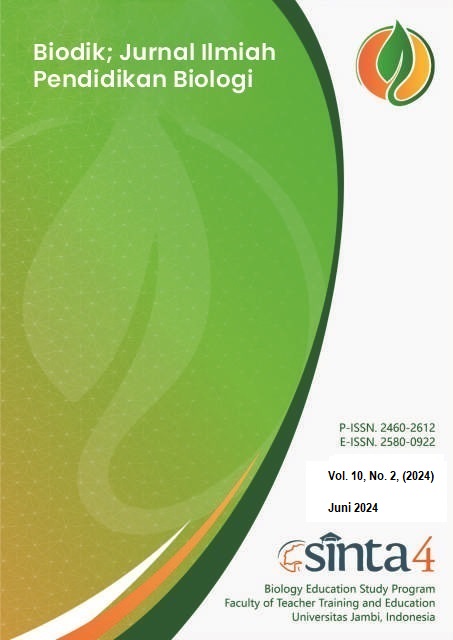Pengembangan E-Modul Interaktif Berbentuk Flipbook Pada Materi Sistem Ekskresi Untuk Kelas XI SMA
(Development of an Interactive E-Module in the Shape of a Flipbook on Excretory System Material for Class XI SMA)
DOI:
https://doi.org/10.22437/biodik.v10i2.35172Abstract
Industrial Revolution 4.0 requires the world of education to adapt to technology. One way to improve the quality of learning is to develop innovative learning media, such as interactive e-modules in the form of flipbooks. This research aims to develop an excretion system material e-module and analyze the suitability of the media, analyze teacher and student perceptions and the validity of the module. This research uses the R&D method using the ADDIE development model which consists of (1) Analyze, (2) Design, (3) Develop, (4) Implementation and (5) Evaluation. The types of data in this research are qualitative and quantitative data. Data collection uses material validation questionnaires, media validation, teachers and students. The tests were analyzed using SPSS 27 software. The test subjects were students and teachers of SMAN 8 Muaro Jambi. The results show that the e-module product in the form of a flipbook on excretory system material can be used in the learning process. The e-module feasibility results were obtained through material and media validation, material validation was carried out three times with a percentage of 90% and media validation was carried out twice with a percentage of 90%, both of which were in the "very feasible" category. The results of students' perceptions of small group trials obtained a percentage of 75.41% in the "good" category and large group trials obtained a percentage of 90.25% in the "very good" category. The results of the biology teacher's perception obtained a percentage of 95% in the "very appropriate" category. The results of the effectiveness test using a paired sample t-test obtained a significance value of 0.000 (< 0.05) with an average N-gain score of 0.46, which is included in the "medium" category and has an influence on students' cognitive abilities. It can be concluded that the development of interactive e-modules in the form of a flipbook, it is suitable for use as teaching material and can improve students' cognitive learning outcomes.
Abstrak. Revolusi Industri 4.0 menuntut dunia pendidikan untuk beradaptasi dengan teknologi. Salah satu cara untuk meningkatkan kualitas pembelajaran adalah dengan mengembangkan media pembelajaran yang inovatif, seperti e-modul interaktif berbentuk flipbook. Penelitian ini bertujuan untuk mengembangkan e modul materi sistem ekskresi dan menganalisis kelayakan media,menganalisis persepsi guru dan peserta didik serta validitas modul. Penelitian ini menggunakan metode R&D dengan menggunakan model pengembangan ADDIE yang terdiri (1) Analyze, (2) Design, (3) Develop, (4) Implementation dan (5) Evaluation. Jenis data pada penelitian ini adalah data kualitatif dan kuantitatif. Pengumpulan data menggunakan angket validasi materi, validasi media, guru dan peserta didik. Tes yang dianalisis menggunakan software SPSS 27. Subjek uji coba yaitu peserta didik dan guru SMAN 8 Muaro Jambi. Hasil menunjukan bahwa produk e-modul berbentuk flipbook materi sistem ekskresi dapat digunakan dalam proses pembelajaran. Hasil Kelayakan e-modul diperoleh melalui validasi materi dan media, validasi materi dilakukan tiga kali dengan persentase 90% dan validasi media dilakukan dua kali dengan persentase 90%,keduanya berada pada kategori “sangat layak”. Hasil persepsi peserta didik uji coba kelompok kecil diperoleh persentase 75,41% dengan kategori “baik” dan uji coba kelompok besar diperoleh persentase sebesar 90,25% dengan kategori “sangat baik”. Hasil persepsi guru biologi diperoleh persentase 95% dengan kategori “sangat layak”. Hasil uji efektivitas menggunakan paired sample t-test diperoleh nilai signifikansi sebesar 0,000 (< 0,05) dengan rata-rata N-gain skor 0,46 termasuk kedalam kategori “sedang” dan berpengaruh dalam kognitif siswa dapat disimpulkan bahwa pengembangan e-modul interaktif berbentuk flipbook layak digunakan sebagai bahan ajar dan dapat meningkatkan hasil belajar kognitif peserta didik.
Downloads
Downloads
Published
How to Cite
Issue
Section
License
Copyright (c) 2024 Erni Rahayu, Ali Sadikin, Afreni Hamidah

This work is licensed under a Creative Commons Attribution-NonCommercial-ShareAlike 4.0 International License.
Copyright Notice
Authors who publish with Biodik : Jurnal Ilmiah Pendidikan Biologi agree to the following terms:
- For all articles published in Biodik : Jurnal Ilmiah Pendidikan Biologi, copyright is retained by the authors and grant the journal right of first publication with the work simultaneously licensed under a Creative Commons Attribution-ShareAlike 4.0 International Licensethat allows others to share the work with an acknowledgment of the work's authorship and initial publication in this journal.
- Authors are able to enter into separate, additional contractual arrangements for the non-exclusive distribution of the journal's published version of the work (e.g., post it to an institutional repository or publish it in a book), with an acknowledgment of its initial publication in this journal.
- Authors are permitted and encouraged to post their work online (e.g., in institutional repositories or on their website) prior to and during the submission process, as it can lead to productive exchanges, as well as earlier and greater citation of published work (See The Effect of Open Access).
















